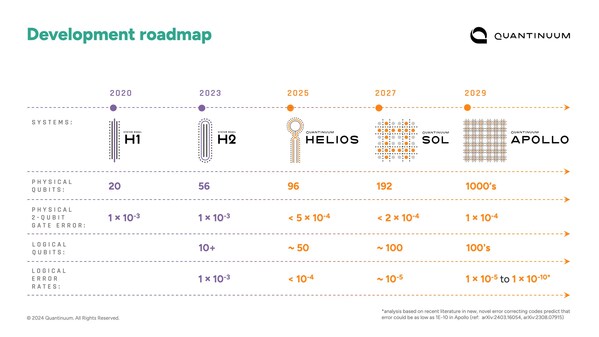With thousands of physical qubits, hundreds of logical qubits, low error rates, and a fully integrated software stack, Quantinuum's roadmap outlines its path to achieve scientific advantage and a tipping point for commercial advantage
In collaboration with Microsoft, Quantinuum also demonstrates two industry firsts: 12 logical qubits and an end-to-end scientific workflow using AI, High-Performance Computing (HPC), and logical qubits on what Microsoft has previously described as "the path to a Quantum Supercomputer"
BROOMFIELD, Colo. and LONDON, Sept. 10, 2024 /PRNewswire/ -- Today, Quantinuum, the world's largest and leading integrated quantum computing company, unveiled its roadmap to universal, fault-tolerant quantum computing by 2030. The roadmap materially accelerates the path to commercial quantum computing systems with the potential to unlock a trillion-dollar market[1] and enable AI to help solve some of the world's most pressing problems. In parallel, Quantinuum in partnership with Microsoft announced a series of milestones and integrations.
Quantinuum's roadmap unveils its fifth-generation quantum computer, Apollo, which will be a fully fault-tolerant and universal quantum computer, capable of executing circuits with millions of gates, delivering scientific advantage and enabling a commercial tipping point.
"We are the only company with a clear and demonstrable path that leverages quantum computing to tackle large-scale scientific and commercial applications," said Dr Rajeeb Hazra, CEO of Quantinuum. "With our proven record of driving technological advancement and the unwavering trust of our global customers and partners, we are confident that we possess the industry's most credible roadmap toward achieving universal fault-tolerant quantum computing."
The roadmap is built on the foundations of Quantinuum's fully scalable quantum charge-coupled device (QCCD) architecture, including a universal gate set and high-fidelity physical qubits uniquely capable of supporting reliable logical qubits. For four years now, Quantinuum has remained steadfast in providing data along with peer-reviewed papers to show the science and engineering work behind these methodical advances.
"Our next system, Quantinuum Helios, will support enough logical qubits to unlock scientific and mathematics advances that will clearly surpass classical computing," Hazra said. "Our roadmap then draws a direct line to hundreds of logical qubits, at which point quantum computing will outperform classical computing to address a broad range of scientific problems in areas like finance, chemistry, and computational biology. We also know, from experience, that utility in the form of applications that are suitable for global enterprises and governments will likely bubble to the surface and increase rapidly over the next 18 months. Our quantum computers are already impossible to simulate classically."
Quantinuum also announced another milestone today in collaboration with Microsoft: achieving 12 logical qubits on the newly updated 56-qubit System Model H2 quantum computer, a 3x advance over the four logical qubits the companies announced in April. Microsoft also used the System Model H1 quantum computer to run the first ever chemistry simulation using reliable logical qubits combined with AI and HPC to produce results within chemical accuracy. Finally, Quantinuum and Microsoft have completed the integration of Quantinuum's InQuanto™ computational quantum chemistry software package with Azure Quantum Elements, making it available to customers through private preview.
"The collaboration between Quantinuum and Microsoft has established a crucial step forward for the industry and demonstrated a critical milestone on the path to hybrid classical-quantum supercomputing capable of transforming scientific discovery," said Dr Krysta Svore – Technical Fellow and VP of Advanced Quantum Development for Microsoft Azure Quantum.
"It is now clear that enterprises need to be ready to take advantage of the progress we can see coming in the next business cycle," Hazra said. "Our customers are placing quantum in their strategic plans and finding new ways to align our quantum system with classical computing and generative AI."
In 2019, Quantinuum's H-Series devices were among the first to be offered commercially via Microsoft Azure. Today, Quantinuum's H1 and H2 quantum computers, Powered by Honeywell, remain available on Azure and directly to Quantinuum customers and partners.
In the past few years, Quantinuum has achieved many significant milestones, including
- Winning the race to "three 9s" hardware fidelity
- Demonstrating the scalability of our architecture
- High-fidelity teleportation of logical qubits
- Fault-tolerant entangling gates
- Beyond-break even with logical qubits
- Lattice surgery
- Real-time fault-tolerant error correction
- The performance of complex algorithms like the quantum Fourier transform at the logical level
- The computing primitives required to demonstrate a magic state distillation protocol
A blog post with more details on the Quantinuum quantum hardware roadmap can be viewed here. The Microsoft announcement regarding the 12 logical qubits can viewed here.
About Quantinuum
Quantinuum, the world's largest integrated quantum computing company, pioneers powerful quantum computers and advanced software solutions. Quantinuum's technology drives breakthroughs in materials discovery, cybersecurity, and next-gen quantum AI. With over 500 employees, including 370+ scientists and engineers, Quantinuum leads the quantum computing revolution across continents.
[1] Source: Quantum Technology Monitor, McKinsey 2023
source: Quantinuum
【etnet 30周年】多重慶祝活動一浪接一浪,好禮連環賞! ► 即睇詳情
































